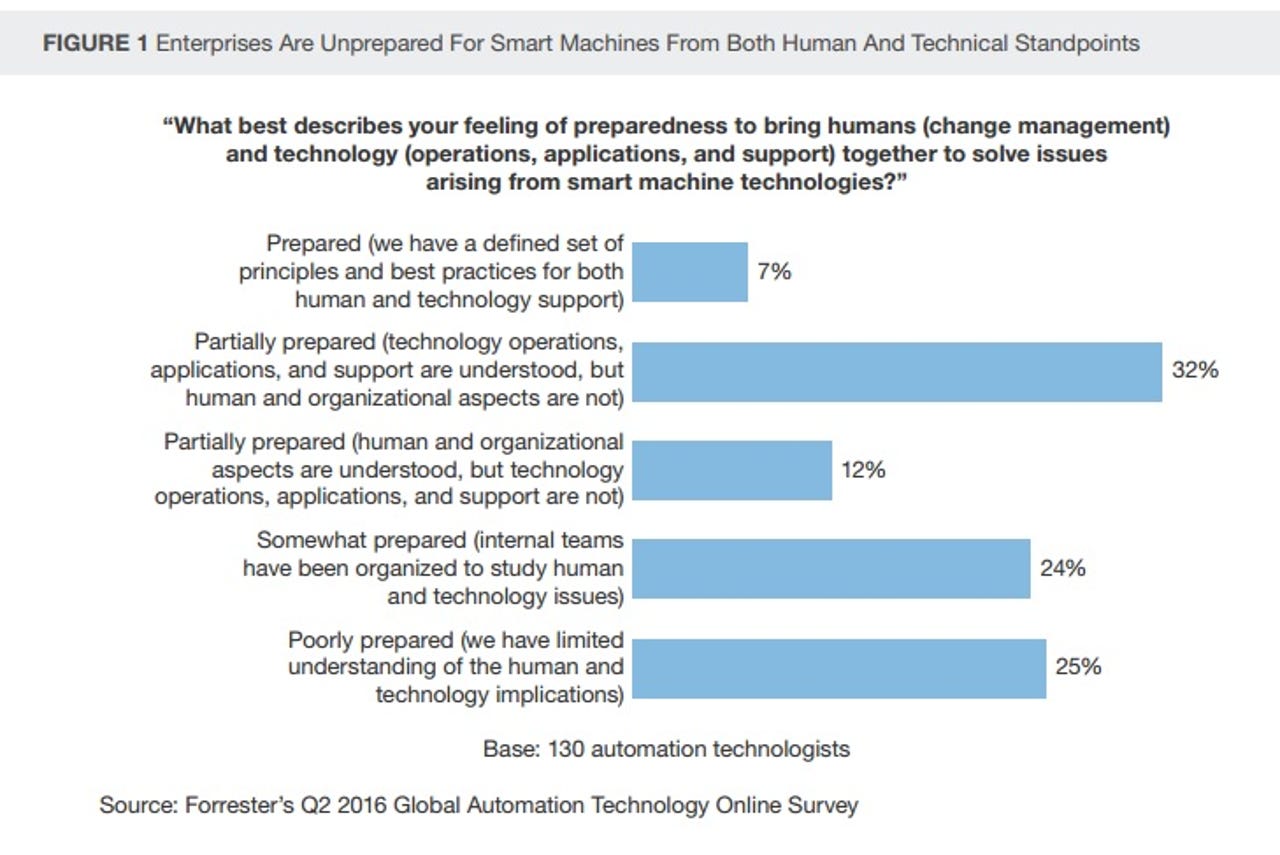Companies, employees not quite ready for cognitive technology wave of robotics, AI, machine learning


Robots, artificial intelligence, machine learning and other cognitive technologies will replace about 7 percent of U.S. jobs by 2025 with office and administrative staff taking the biggest hit, according to a Forrester Research forecast.
The bad news is jobs will be lost. The good news is that new gigs will be created as cognitive technology takes hold. One reason the disruption won't be larger or happen sooner is that companies aren't ready for the change related to the new automated workforce, said Forrester.
Among the key items:
- 16 percent of U.S. jobs will be replaced, but 9 percent of jobs will be created. That's how Forrester gets to the 7 percent job loss by 2025 figure.
- Emerging jobs will be robot monitoring pros, data scientists, automation specialists and content curators.
- 93 percent of automation technologists feel unprepared to take on smart machine technologies.
- 83 percent saw cognitive computing as critical to their companies' future.
- 32 percent of respondents said they are prepared for the cognitive technology changes ahead, but only 12 percent are prepared to deal with the human and organizational fallout.
- 46 percent say the number of jobs will remain about the same and 43 percent of respondents thought jobs would decline.
In a report, Forrester quoted a director of enterprise architecture at banking giant UBS as saying:
In our bank, we already have back-end systems that make decisions and automate 90% of a transaction. The 10% on the margin is what's left. Next will be employees who deal with clients.
However, Forrester's report had an optimistic tone. Customers will need human advice more than ever, people can provide nuance better than machines, and displacement and transformation will happen at the same time.
More: Hug or high-five? MIT algorithm studies "The Office" to predict social interactions | No, AI isn't going to steal your job, but it will change it - and here's how | Robots: Why tech advances mean the tipping point is coming | Home care robotics market set to quadruple | Apple supplier Foxconn automates 60,000 jobs, but says quality, productivity will improve |
Nevertheless, sales jobs will take a hit from customer self service after office and admin staff falls away. Professional roles like doctors and scientists will go away more slowly. Management, business and financial jobs will be most resistant to the robots. One banker did note that robots and automation will close the books at the end of quarter and fiscal year instead of the 2,000 humans today.
In any case, Forrester's report is worth pondering for business tech leaders. The kicker:
The cultural backlash will be real and powerful, but it won't roll automation back. Labor conflict over automation will escalate as millions of today's employees, short of digital-age skills, slide into the obsolescence queue. Thus, enterprises should maintain an active communication strategy, both internally (for workers) and externally (for public relations) to proactively explain and defend automation efforts. This story is easier to tell when you aren't merely displacing jobs but rather creating new value for customers by having robots work side by side with your employees.
Forrester said that enterprises should do the following:
- Focus on interaction models and data, not algorithms, which will change.
- Prepare for self learning systems in the future.
- Curate the knowledge base for expertise.
- Build in safeguards so a cognitive system doesn't learn a bad script or knowledge base.
- Get compliance and legal teams involved in cognitive planning.
- Spend time on change management and reaction from employees.
- Tie bonuses and incentives to cognitive rollouts.
- Rethink talent acquisition.
- Conduct proof of concepts.
- Use Robotic Process Automation, a roadmap that focuses on tasks that can be automated to reduce errors.